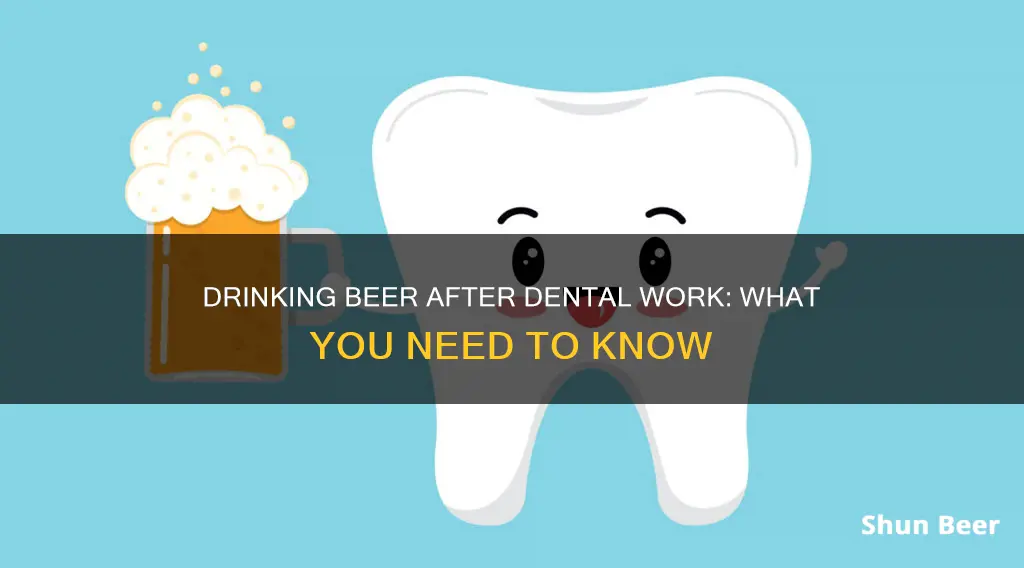
It is generally advised to refrain from drinking beer or any other alcoholic beverage for at least 72 hours after a tooth extraction. This is because alcohol can increase the risk of a dry socket, a painful condition where the blood clot over the wound becomes dislodged, exposing nerves and leading to potential bacterial infections. Additionally, alcohol can interfere with certain medications, such as painkillers, causing adverse effects on the body. While alcohol may not directly impact the structural integrity of dental fillings, it is still recommended to wait until the numbness from the local anaesthesia wears off, usually around 3-4 hours, to avoid a poor drinking experience.
| Characteristics | Values |
|---|---|
| Can you drink beer on the second day after dental work? | It is not recommended to drink beer on the second day after dental work. Dentists recommend waiting at least 72 hours after a tooth extraction before consuming any alcoholic beverages. In the case of a cavity filling, it is suggested to wait at least 3-4 hours before drinking alcohol. |
What You'll Learn

Drinking alcohol after a filling
It is generally considered safe to drink alcohol after getting a filling. However, it is important to consider the timing and amount of alcohol consumed relative to the dental work and any medication you may be taking. If you have received numbing shots, it is probably okay to drink alcohol, but the timing and amount matter.
If you have a temporary filling, it is important to ask your dentist whether the restorative material is dissolvable in alcohol. If you have a plastic filling, you can likely eat and drink right away. However, if you have a silver amalgam filling, it is recommended to wait about four hours for it to set before consuming alcohol.
Additionally, if you are taking antibiotics or pain medication after your dental work, it is best to avoid drinking alcohol. Excessive alcohol consumption can damage other parts of your body, so moderation is important. Always follow your dentist's instructions and be mindful of any time restrictions or special precautions they may advise.
In summary, while it is typically safe to drink alcohol after a filling, it is crucial to consider the type of filling, the timing and amount of alcohol consumption, any medications you may be taking, and the potential risks associated with excessive drinking.
Beer and Keto: What's Allowed?
You may want to see also

Alcohol and pain medication
Drinking alcohol while taking prescription opioids, such as oxycodone, morphine, or fentanyl, can slow or stop breathing, lower pulse and blood pressure, and lead to unconsciousness, coma, or even death. Mixing alcohol with over-the-counter pain medications like ibuprofen, naproxen, aspirin, or acetaminophen can cause stomach upset, bleeding ulcers, and rapid heartbeat.
The National Institute on Alcohol Abuse and Alcoholism indicates that 28% of chronic pain sufferers self-medicate with alcohol. However, drinking less or no alcohol can improve your quality of life. Alcohol can worsen pain symptoms over time and lead to the development of a tolerance, which can progress towards alcoholism.
Combining alcohol and pain medication can have devastating side effects, including an increased risk of overdose, severe central nervous system depression, aggression, lapses in judgment, dizziness, heartbeat alterations, and unconsciousness. It is important to always take pain medications as directed and read the labels carefully. Even if there is no explicit warning about mixing with alcohol, it is generally recommended to avoid consuming more than 4 to 5 drinks per day.
If you are considering introducing alcohol into your lifestyle while taking pain medication, it is crucial to consult with your doctor or pharmacist first. Alcohol can negatively interact with pain relief medications, reducing their effectiveness or making them toxic or harmful to your body.
Raw Vegans and Beer: What's the Verdict?
You may want to see also

Blood clotting and drinking
Drinking alcohol after a cavity filling will not affect the structural integrity of the restoration. This is because composite fillings are fully cured and hardened before you leave the dentist's office, and the bonding agents for fillings often contain alcohol. However, while it is not forbidden, it is not recommended to drink immediately after a filling due to potential adverse effects. Firstly, you are likely to still be numb from the local anaesthetic, which can interfere with your taste buds and ruin your drinking experience. Secondly, numbness can cause drooling and make it difficult to hold a drink. It is recommended that you wait at least 3-4 hours or until the numbness has worn off before consuming alcohol.
In the case of a tooth extraction, a more major dental procedure, drinking alcohol can have more serious consequences. Dentists recommend that you do not consume alcoholic beverages for at least 72 hours following the procedure, with a wait time of seven to 10 days being ideal to allow the wound in your mouth to close. Alcohol has a blood-thinning effect, which can cause a dry socket by preventing a blood clot from forming over the extraction site. A dry socket exposes the nerves and bones near the extraction site, leading to severe pain and an increased risk of bacterial infection, which slows down the healing process and can cause further complications.
Additionally, mixing alcohol with pain medication can be dangerous, potentially leading to impaired motor function, liver failure, and dizziness. It is best to avoid alcoholic drinks until you have finished your prescribed course of pain medication. Alcohol can also lead to dehydration, making a speedy recovery more difficult to achieve.
Overall, while drinking alcohol after dental work may not directly affect your fillings, it is important to consider the potential risks to your health and recovery process, especially in the case of more invasive procedures such as tooth extractions.
Beer and Zithromax: Is It Safe to Mix?
You may want to see also

Drinking before dental work
Nitrous oxide, commonly known as laughing gas, is the least invasive and mildest form of dental sedation. It will relax you while keeping you fully aware of your surroundings, and the effects wear off quickly once you remove the mask. Oral conscious sedation and IV sedation are also options if you prefer something stronger. With these options, you'll need someone to drive you to and from your appointment, and you're likely not to remember much of it.
If you do choose to drink alcohol before your dental appointment, be sure to have a designated driver and always follow your dentist's instructions regarding dietary restrictions and medication. It's also important to note that drinking before dental work may impact your ability to consent to treatment, so it's best to discuss any concerns with your dentist beforehand.
While it may be tempting to reach for an alcoholic beverage to calm your nerves, it's important to remember that alcohol can thin your blood. This could lead to increased bleeding during certain dental procedures and may prolong your recovery time. Additionally, alcohol can dehydrate you, which is not ideal before any medical procedure, as it can affect your body's ability to heal.
Overall, it's best to avoid drinking alcohol before dental work. If you're anxious about the procedure, speak to your dentist about sedation options or other ways to help you relax. Your dentist will be able to advise you on the best approach to ensure your comfort and safety during your treatment.
Understanding the Working of a Cup Beer Dispenser
You may want to see also

Recommended drinks after a tooth extraction
After a tooth extraction, it is important to keep the extraction area clear of food particles and bacteria to allow a clot to form and prevent infection. Drinking lots of water helps to keep your mouth clean and prevent infection, as well as keeping your body hydrated. Water should be sipped rather than drunk through a straw, as the sucking motion can disturb the extraction site.
Sports drinks are also an option, as they hydrate effectively, but they usually contain high levels of sugar, so be sure to brush your teeth afterward. Milk is another good choice, as it is a source of calcium, which helps to strengthen teeth.
Smoothies can provide the vitamins and nutrients your body needs, but it is important to avoid fruits with small seeds, like blackberries and strawberries, as these can get stuck in the extraction site and cause complications.
It is best to avoid alcoholic and carbonated beverages, as these can damage the clot in the extraction site and cause complications. Coffee should also be avoided, as the heat can prevent a blood clot from forming or dislodge a newly formed one, which may lead to a condition called dry socket.
Beer and Phentermine: What's the Harm?
You may want to see also
Frequently asked questions
It is not recommended to drink beer or any other alcoholic beverage immediately after dental work. It is best to wait for at least 3-4 hours or until the numbness from the local anaesthesia wears off.
Drinking beer immediately after dental work can lead to an altered taste as the numbness from the procedure can interfere with your taste buds. It can also result in drooling and difficulty holding a drink.
It is recommended to wait for at least 72 hours after dental work to consume any alcoholic beverage. Dentists suggest a wait time of seven to 10 days to allow the wound in your mouth to close properly.
Drinking beer too soon after dental work can increase the risk of dry socket, where the blood clot over the extraction site becomes dislodged, exposing underlying nerves and leaving the area vulnerable to bacterial infection. Alcohol can also thin the blood, making it harder for the blood to clot, and lead to dehydration, hindering the recovery process.
Yes, it is recommended to stay hydrated by drinking plenty of water, clear juices, or milk, which can have a soothing effect. Other options include flavoured and unflavoured milk, strained smoothies without seeds, and non-acidic juices such as apple juice.







